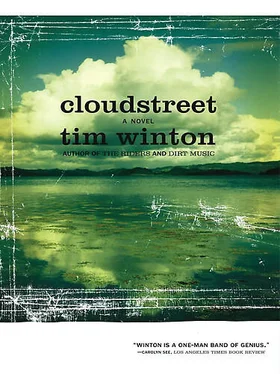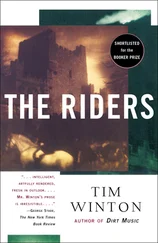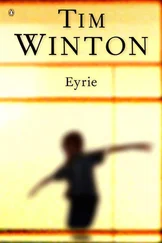Plenty.
You ever have the same dream twice?
Quick nodded.
I keep having this dream, the old man said, almost in a whisper. It’s the first thing I can remember in my life — you know my earliest memory. It’s dark and raining and I’m in a storm and I’m in the middle of a creek — I can hear it roaring and see the white. There’s lightning but it doesn’t show anything up, just blinds me. I’m absolutely packin myself. And I’m on my father’s shoulders and he’s carryin me across. He’s steady and big, and we’re makin it. I’m just hangin on, and he’s takin me across.
Their eyes met. Quick smiled.
That’s a nice one.
I always wake up in tears.
Why don’t you come down and make the pasties? Mum’ll botch em up.
Lester smiled. Don’t ever join the army.
Geez, one army’s enough.
She’s a good woman, Quick. She’s worth two of me.
But she makes a lousy pasty.
Go on, you drongo.
Quick left and saw Beryl coining.
He alright?
Quick nodded.
I’ll see if he wants something.
He doesn’t want you, Quick thought; you’re the last thing a man needs. Regular bedside Betty.
He heard her open the door behind him as he went on up the front to the shop. The bell was ringing.
 Promises
Promises 
Lester was most of the way out of his pyjamas when Beryl broke in, knocking as she came, and he found himself standing like a soldier ready for a short arm inspection. Beryl had a sweat on her upper lip; her eyes were china white taking in his kit. She showed none of the disinterest army matrons had impressed him with, and he felt a fury rising out of his embarrassment.
Would you like to break a piece off as a souvenir, Beryl?
What?
He hauled up his pyjama pants and sat back on the bed.
What do you want, Beryl?
Oh, strewth, I’m sorry, Lester.
She stood with her back to the door, wearing a faded bag of a frock and a pair of chunky heels that must have given her curry all day in the shop. He knew she was a fragile thing, and he’d seen her kindness to his children and the gratitude she offered to Oriel for building her back into someone who could stand in her own shoes again; regardless of the style. She worked hard in this house and he respected her for it, but he’d never been able to cipher out why she’d stayed so long.
As he watched, a composure, a toughness came into her face that he’d never seen before, and he was about to ask her again what the matter was when she started talking.
I know about you and Mrs Pickles, Lester.
You must hang off the banisters like a fruit bat.
I watch you.
You don’t know anythin, Beryl, he said, a quiver coming to his jaw. How on earth could you know that what you think happened actually happened?
Well, you seem to know what I’m talking about without any explanation.
Lester tried to scrape up some form. He looked at his flat pink feet sticking from his barber’s pole jarmies. Well, he thought, catastrophe hasn’t exactly been long in the wings. Least it hasn’t kept me waitin.
She’s a low woman, Lester.
That’s our landlady you’re talkin about, he said with the feeblest of grins.
I’m shocked, surprised even.
Me too.
You’re in trouble.
More than you think, Beryl. You know I’ve never been in trouble in my whole life — I mean seriously nose deep in the nure. I’ve kept laws and rules and contracts—
And now you’re gunna tell me you feel free for the first time in your life, like Bette Davis or somebody! That’s really got to be the living—
Beryl! he hissed. Keep your blessed voice down.
Beryl sagged back against the door.
Are you gunna dob on me, Beryl? Is that why you’re here? I haven’t got a brass razoo if it’s money you’re after.
Oh, you … bugger!
State your business, Beryl. What have you come to do to me?
Beryl came to the edge of his bed and her proximity forced him back onto the pillow.
I came to tell you to leave off with Mrs Pickles.
Or?
Or you’ll ruin your life and break a fine woman’s heart. Mrs Lamb deserves better.
Fair enough, Beryl.
What?
I said you’re right.
Well … well good then.
Go, Beryl.
Lester lay back and felt the cool palms of his hands on his face.
 The World Through Beryl
The World Through Beryl 
Pausing for barely a second now and then like a motor gently missing, Oriel stopped to watch Beryl, who had grown paler still. That woman will disappear if she keeps fading like this, she thought. What is it with Beryl? Hunger for a man? What man deserves a good honest woman like Beryl? Even as she watched, Oriel saw Beryl fading by the window. She saw the mulberry tree through the tall woman’s translucent, veiny arms. The sky moved behind her. You could see the whole world through Beryl Lee.
Take a break, Beryl.
No, I’m right. Truly.
 Business
Business 
For the better part of the day, Sam stays in Kings Park where Lester left him at dawn. He sleeps in cool shade before the sun gets high, and later he walks down the quiet avenues, along the endless rows of trees, each with its plaque bearing the name of a dead soldier, his unit, his deathfield. The bush of the park comes alive with sweeping birds, the scuttle of goannas and rabbits. All day he wanders, finding a statue, a new road, a landscaped garden, and at the eastern edge, a view of the city with the river leaning its way in and out of the plan below. A ferry pushes its way from Mends Street to the Barrack Street jetty. A rich man’s yacht, red sails shuddering like a singer’s lungs, cuts in behind it, and children wave. He’s come to like the place, he discovers. The autumn blue sky bowls across the whole business and warms his certainty. He feels the notes in his pocket.
Heading down to the big boulevard of eucalypts, past the statue of John Forrest, he comes to the great log the kids call the Toothpick. It’s huge and barely weathered, ten feet high and a hundred feet long, on its side like a fallen beast. At its sawn ends he sees the lines that divide its years, concentric markings like the inside of a gobstopper.
There’s some floorboards in you, old son, he murmurs, leaving.
Lightbrained with hunger, he goes on down to Mount Street, past the grand houses and the gleaming Buicks and Humbers, into the city. Hay Street is full of trams and beer barrels. Kids are selling the Mirror and the West on corners, trollies hiss by down William Street, and outside Foys the cashews roasting, the sandwich counter roaring, send him giddy and glasseyed on his way. Afternoon picture shows are finishing with a straggle of squinteyed patrons coming back out onto the street as if stunned by the ordinariness of the day. Men smoke on the steps of the GPO, eat pies and stay wary of their suits. With two hundred pounds in his pocket, he sits in Forrest Place with the gas-crazy Anzacs and mealy whingers who ask for a fag and a florin and look at you like you might be the bloke who caused all their problems in the first place. With two hundred quid against his leg, he sits without food, without a drink or a smoke, looking across the rails toward Roe Street where someone’s backyard is being rigged with a tarp and the dirt raked in a flat circle for tonight. All along the street, the tired old tarts are calling sailors and frightening off schoolboys while the trains shunt by spitting steam. Sam feels change in his pocket. Yes, he’ll buy a shave in an hour, and after dark he’ll go across the bridge, hungry, smokestarved, dry, clean as a monk. And lucky.
Читать дальше

 Promises
Promises 










